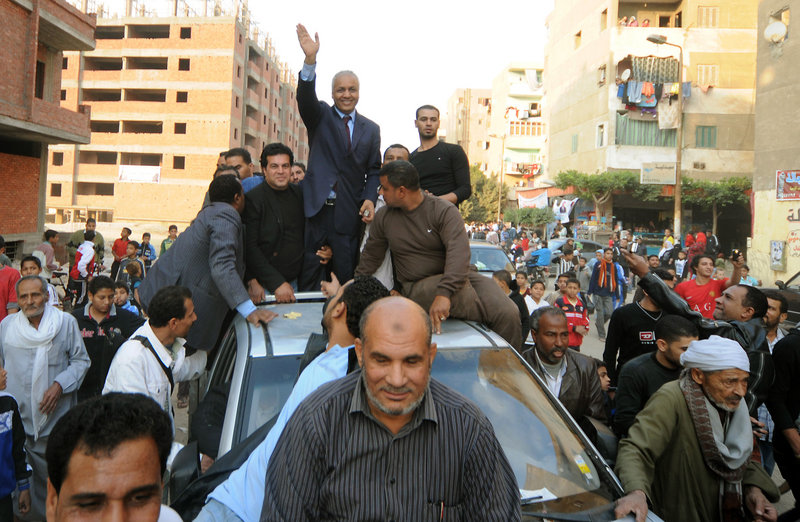CAIRO – Islamists appear to have taken a strong majority of seats in the first round of Egypt’s first parliamentary vote since Hosni Mubarak’s ouster, a trend that if confirmed would give religious parties a popular mandate in the struggle to win control from the ruling military and ultimately reshape a key U.S. ally.
Final results, expected today, will be the clearest indication in decades of Egyptians’ true political views and give the long-banned Muslim Brotherhood a major role in the country’s first freely elected parliament. An Islamist majority could also herald a greater role for conservative Islam in Egyptian social life and shifts in foreign policy, especially toward Israel and the Palestinians.
The showing in Egypt – long considered a linchpin of regional stability – would be the clearest signal yet that parties and candidates connected to political Islam will emerge as the main beneficiaries of this year’s Arab Spring uprisings.
Tunisia and Morocco have both elected Islamist majorities to parliament, and while Libya has yet to announce dates for its first elections, Islamist groups have emerged as a strong force there since rebels overthrew Moammar Gadhafi in August. They also play a strong opposition role in Yemen.
Judges overseeing the Egyptian vote count said Thursday that near-complete results show the Muslim Brotherhood, the country’s largest and best organized political group, could take as many as 45 percent of the contested seats.
In addition to the Muslim Brotherhood wins, parties backed by ultraconservative Salafist Muslims looked poised to take 20 percent, giving Islamist parties a striking majority in the first round of voting in key districts, including Cairo and Alexandria.
Similar results in the remaining rounds would give Islamist parties a majority in parliament, which many believe they will use to steer the long-secular U.S. ally in a more religiously conservative direction.
The Islamist victories came at the expense of a coalition of liberal parties called the Egyptian block, the group most closely linked to the youth activists who launched the anti-Mubarak uprising – and which is expected to win only about 20 percent of seats.
In Egypt, the Brotherhood was officially banned and suppressed for decades, but built a nationwide network of activists who focused on providing services to the poor. After Mubarak’s fall, the group campaigned as the Freedom and Justice Party, their organization and the Brotherhood’s name-recognition giving them a big advantage over newly formed liberal parties.
The election also provided an opening for the Salafist Muslims whose strict Islamic practice is similar to that in Saudi Arabia.
Send questions/comments to the editors.



Success. Please wait for the page to reload. If the page does not reload within 5 seconds, please refresh the page.
Enter your email and password to access comments.
Hi, to comment on stories you must . This profile is in addition to your subscription and website login.
Already have a commenting profile? .
Invalid username/password.
Please check your email to confirm and complete your registration.
Only subscribers are eligible to post comments. Please subscribe or login first for digital access. Here’s why.
Use the form below to reset your password. When you've submitted your account email, we will send an email with a reset code.